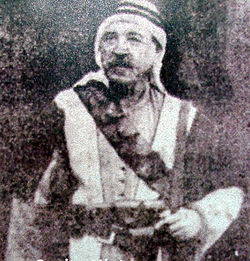Saleh al-Ali
| Saleh al-Ali صالح العلي |
|
|---|---|

Saleh al-Ali during the rebellion of 1919
|
|
| Born |
Saleh Ahmad al-Ali 1884 Al-Shaykh Badr, Ottoman Syria |
| Died | 13 April 1950 (aged 65–66) Tartus, Syria |
| Known for | Commander of the Syrian Revolt of 1919 |
Saleh al-Ali or Shaykh Saleh Ahmad al-Ali (Arabic: الشيخ صالح أحمد العلي) (1884 in Al-Shaykh Badr – 13 April 1950 in Tartus) was a prominent Syrian Alawi leader that commanded the Syrian Revolt of 1919, one of the first rebellions against the French mandate of Syria before the Great Syrian Revolt.
Saleh al-Ali was born in 1884 to a family of Alawi notables from Ash-Shaykh Badr, in An-Nusayriyah Mountains in northwest Syria. He reportedly clashed with the Ottomans in 1918 before their withdrawal from Syria, killing two Ottoman soldiers who were harassing a wife of his father. This act gained him a local reputation as a rebel. After his father's death, he built a shrine for him and reportedly performed miracles at the site, according to local legend.
In 1918 the French occupied the Syrian coast and began to move into the interior. On December 15, 1918, Saleh al-Ali called for a meeting of prominent Alawi notables in the town of Sheikh Badr. Al-Ali alerted the attendees that the French had already occupied the Syrian coast with the intention of separating the region from the rest of the country, and urged them to revolt and expel the French from Syria. When the French authorities heard of the meeting, they sent a force from Al-Qadmus to the town of Sheikh Badr in order to arrest Saleh al-Ali. Al-Ali and his men ambushed the force at the village of Niha, west of Wadi al-Oyoun. The French forces were defeated and suffered more than 35 casualties.
After the initial victory, al-Ali started to organize his rebels into a disciplined force, with its own general command and military ranks. The army was supported by the local population, and some women supplied water and food and replaced the men at work in the fields. Al-Ali also allied himself with the rebellion of Ibrahim Hananu in Aleppo, the uprising in Talkalakh by the Dandashi tribe and the revolt in Antioch by Subhi Barakat. He also received funds and arms from Kemal Atatürk of Turkey which was also at war with France at the time.
...
Wikipedia
